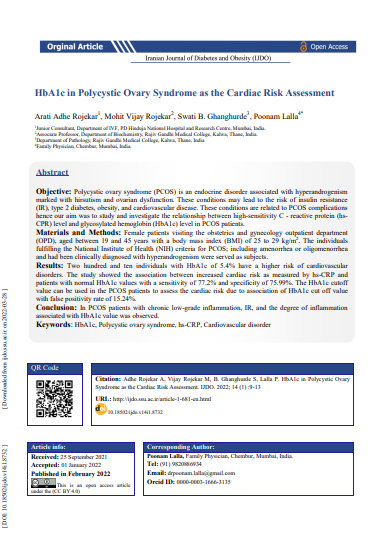HbA1c in PCOS - A cardiac risk marker
HbA1c as a Cardiac Risk marker in Polycystic Ovary Syndrome
-Compiled by Dr. Poonam Lalla –AGM Marketing
Polycystic ovary syndrome (PCOS) is an endocrine disorder associated with hyperandrogenism marked with hirsutism and ovarian dysfunction, infertility, obesity, and enlarged cystic ovaries. The prevalence of PCOS is most common in women of reproductive age. PCOS patients are prone to increased risk of cardiovascular disease, hypertension, diabetes, and other metabolic disorders, specifically carbohydrate and lipid metabolism. PCOS affects the fertile period of women with an increased prevalence of gestational complications, such as miscarriage, gestational diabetes, and preeclampsia. The gonadotropin-releasing hormone triggers the secretion of luteinizing hormone (LH) and follicle-stimulating hormone (FSH) which is essential for distinct phases of the menstrual cycle. Early diagnosis is crucial to decrease the risk of complications due to PCOS.
High blood sugar levels may provide a crucial breakthrough in the pathogenesis of PCOS and related complications. PCOS etiology is unknown and hence considered a multifactorial disorder with various genetic, metabolic, endocrine, and environmental abnormalities. Due to the large diabetic population, India is closely related to PCOS and metabolic syndrome or its associated complications. Irrespective of the geographic origin of individuals, a rapidly increasing prevalence of polycystic ovarian syndrome, excess body fat, negative body fat patterning, hypertriglyceridemia, and obesity-related diseases, such as diabetes and cardiovascular disease. Hence, it is necessary to diagnose PCOS early in Indian women so that primary preventive strategies can be initiated earlier.
C-reactive protein (hs-CRP) has proven as a better marker for predicting cardiovascular diseases in patients with PCOS. It is well documented that glycosylated hemoglobin (HbA1c) is a known marker for Insulin Resistance and cardiovascular diseases. These conditions are related to PCOS complications hence a study aimed to investigate the association between hs-CRP level and HbA1c level in patients with PCOS was initiated.
Transasia undertook a study to understand and associate the risk of cardiovascular risk in women with PCOS. This study was published in the “Iranian Journal of Diabetes & Obesity ( IJDO)”
- Topic of Study: HbA1c in Polycystic Ovary Syndrome as the Cardiac Risk Assessment
- The samples were processed for CRP on XL 640-Fully Automated Biochemistry Analyzer & HbA1C test on Hb-Vario (Transasia Bio-Medicals Ltd.)
- Patients visiting the obstetrics and gynecology outpatient department (OPD) of a tertiary care hospital in Mumbai were selected. Female patients between 19 and 45 years with a body mass index (BMI) of 25 to 29 kg/m2 were selected.
- Two hundred and ten individuals with HbA1c of 5.4% were reported to have a higher risk of cardiovascular disorders.
- The study indicated an association between increased cardiac risk as measured by hs-CRP and patients with normal HbA1c values with a sensitivity of 77.2% and specificity of 75.99%.
- This study concludes that in PCOS patients with chronic low-grade inflammation, IR, and the degree of inflammation associated with HbA1c value were observed.
To know more about this paper, click on the link below
- Authors: Dr. Arati Adhe Rojekar, Dr. Mohit Vijay Rojekar, Dr. Swati Ghanghurde, Dr. Poonam Lalla
- Venue: Rajiv Gandhi Medical College, Kalwa, Thane, Maharashtra
- Published in: Iranian Journal Of Diabetes And Obesity, Volume 14, Issue 1, Spring 2022, Page number 09-13
- Online Link: HbA1c in Polycystic Ovary Syndrome as the Cardiac Risk Assessment - Iranian Journal of Diabetes and Obesity (ssu.ac.ir)
